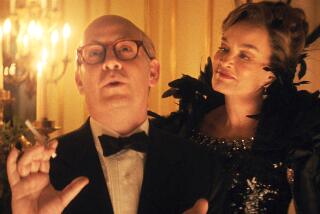LOS ANGELES FESTIVAL : AN IRISHMAN WRESTLES ‘BABBITT’ TO THE MAT
Ron Hutchinson, a granite block of a man with hair cut in a harsh, flat-top style, never quite looks his visitor in the eye. His childhood home was Catholic Belfast, but his current home is St. Gennys, in England’s distant Cornwall region.
A removed and cold Celt, you think. Certainly not a man who is, by his own confession, “hopelessly in love with America” as well as the stage adapter of Sinclair Lewis’ novel of 1920s heartland America, “Babbitt.” As Hutchinson talked, feelings of vague intimidation gave way to fascination with a writer who works with and thrives on paradox.
As if to italicize this, Hutchinson, in the midst of talking about his new play, “Babbitt: a Marriage,”) (opening Thursday at the Mark Taper Forum) recounted something from his past. “Telling the story well, I was brought up to believe, is better than telling the truth. There’s the deeper truth of intention and effect, beyond the facts of what happened.”
The first paradox, of course, is that an Irishman is wrestling this seemingly indomitable American book to the stage mat.
“Yes, but I think I’m equipped for it. American writers would likely feel they were required to savage Babbitt and his myth of prosperity. Many British writers would take cheap shots.”
George Follansbee Babbitt (played at the Taper by Charles Hallahan, who portrayed a cop in Hutchinson’s “Rat in the Skull,” last year at Taper, Too) is a man who feels the tremors of dread shake his life of real estate profits and staid domesticity. He makes pathetic stabs at revolt, leaving office and home behind for the Maine woods, only to return to his life of booster clubs and land deals.
“You’re watching a desperate man,” Hutchinson said, sitting in a Taper office, “who’s attempting to cope with the impossible. But the fact that he’s trying to do something . . . showing that, instead of dwelling on how impossible his lot is, was my goal.”
So powerful is the novel as a cultural artifact that babbitt can be found in the dictionary. Hutchinson takes exception with the implications of the word’s pejorative definition. “I actually like Babbitt. I don’t think you could write an annotation of ‘Babbitt’ unless you’re in love with the man, and through him, America.
“Finding a book where there’s fundamentalist religion, business shenanigans, and a belief that the President (then, it was Warren G. Harding) is infallible because he’s nice--those things are either disturbing because they’re again a part of American life under Reagan, or affirming because the structure coped with those problems before, and went on. I choose the latter, partly because I share a common Irish view of the States as opportunity. We’re forever wishing our granddaddies had kicked the mud off their boots and come here.”
Liking Babbitt, in fact, was a problem in the adaptation, the playwright said: “Lewis had the same problem, because he later admitted that he was Babbitt.”
Hutchinson would never go that far, but his research revealed another link with the novelist. “Babbitt” was composed a mere 12 miles from Hutchinson’s Cornish house. “He wrote it with a European sensibility,” he said, “and that could be why it had a greater effect there than here.”
Which leads to the second paradox: how to write both at a distance and sympathetically, especially from a book drenched in sarcasm.
“It stalled many a writer before me,” he said, barely smiling. “The trick is taking the interior dread and putting it on stage. This outpatient couldn’t exist without music.”
More specifically, barbershop quartet music. Employing male (The 139th Street Quartet) and female, or “Sweet Adelines” (The Sundance Quartet) groups, Hutchinson, with the aide of composer Mel Marvin, has barbershoppers take on the role of a Greek chorus-cum-Brechtian ensemble.
“What amazed me about barbershop singers when I first heard them eight years ago,” he said, “was their power. The surface is sweet and corny, but it’s technically remarkable, pure a capella. My plan, and I think we’re pulling it off, was to take this familiar form through an arc and turn into a threatening musical invention. The words become a clenched fist.
“Lewis hated small-town life, but what he really wrote was a paean of self-hate. He was deep in the trenches with womankind. The story’s set on fire for me when he writes about marriage, the hopelessness of finding a lasting relationship.” Thus, his play’s subtitle.
“Y’see, the men of Zenith can never say to each other, ‘I love you.’ They cover up their feelings with verbal pats on the back, killing themselves, and the women.
“There’s a darkness in this story,” Hutchinson said, making eye contact for a moment, “that I just can’t kick off my shoe.”
More to Read
The biggest entertainment stories
Get our big stories about Hollywood, film, television, music, arts, culture and more right in your inbox as soon as they publish.
You may occasionally receive promotional content from the Los Angeles Times.










